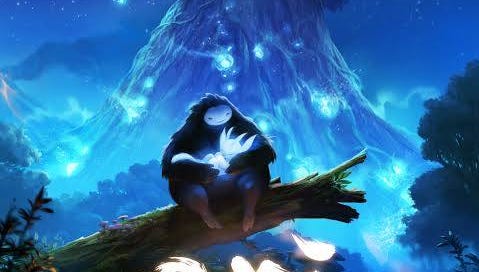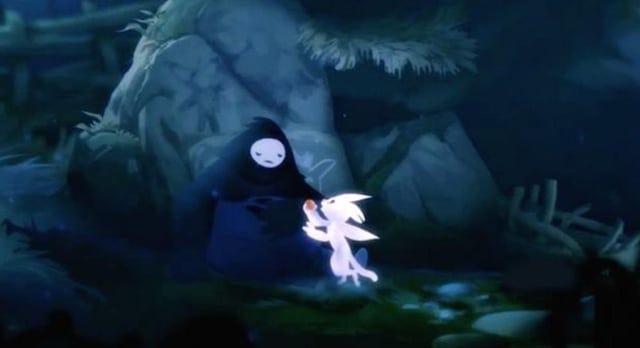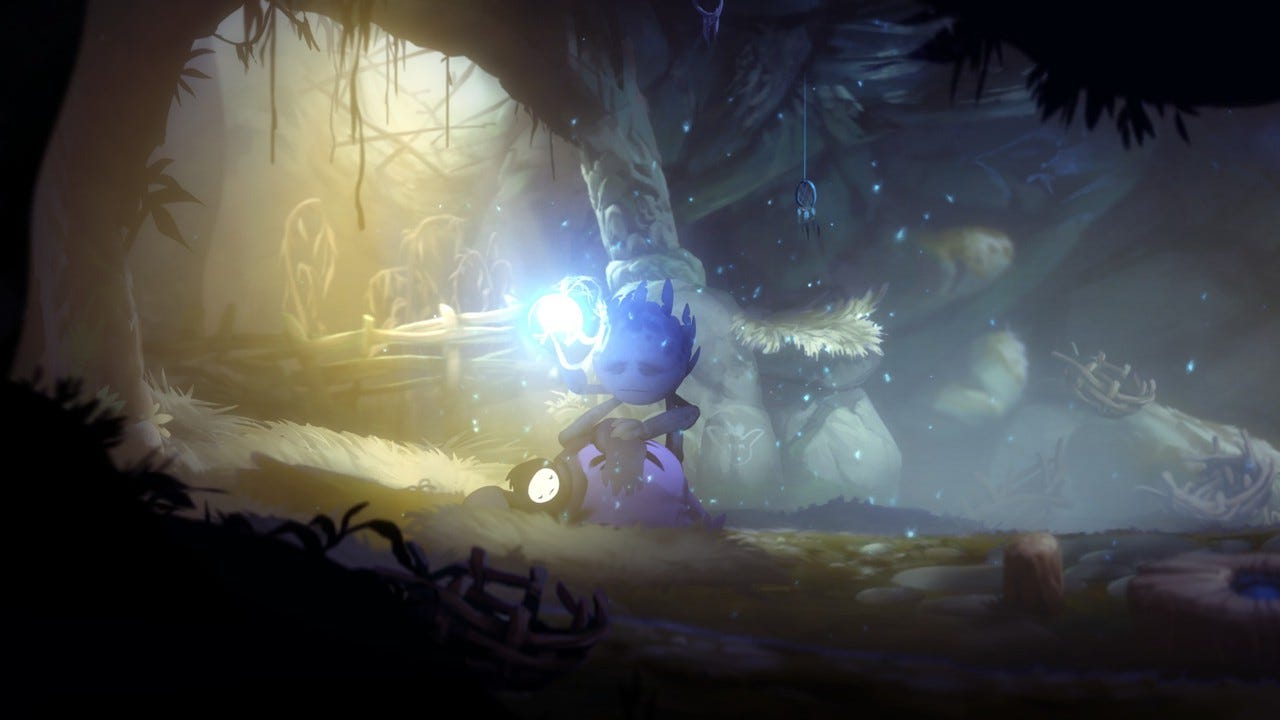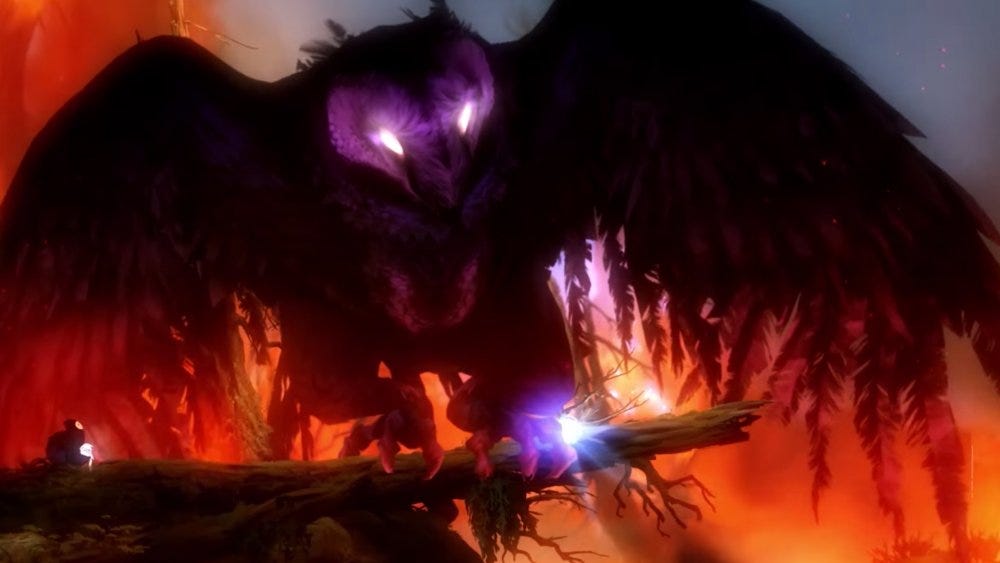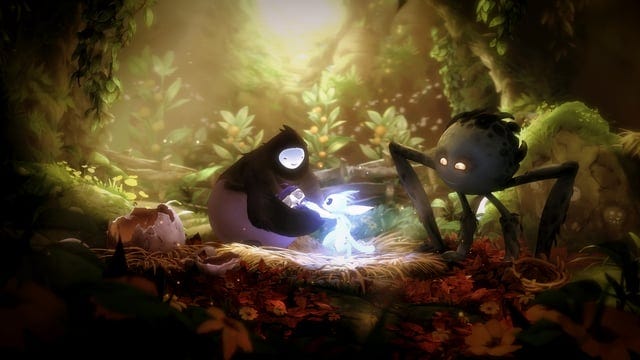If you haven’t heard of Ori and the Blind Forest, it’s a 2D platformer game with more modern video game aesthetics. You play as Ori (which sounds like a Japanese word for I), who is an unspecified glowing creature (in the sequel game he is referred to as a spirit) striving to return light and life into a forest corrupted by darkness. It has fun mechanics, primarily puzzle-based, though there is plenty of combat as well. As you explore the world, you gain access to new abilities to help you reach the next area, though each time you get a new ability you can be sure that the puzzles will get more complicated.
But the reason I’m posting about it here is for the story. It’s a simple one, but beautiful nonetheless. So if you intend on playing it, bookmark this post and come back to it later so you don’t get spoilers. But if you want convincing that the story is worth it, read on!
Twice Orphaned
The story opens up with a leaf blown off the tree of light in a storm. The wind carries the leaf far away, and the leaf becomes Ori. A motherly creature, Naru (name meaning to become), takes Ori in and feeds him, not caring where he came from or why he looked different. Rather, she just sees a child, and quickly grows to love him. Her motherly love is so strong, in fact, that when food became scarce and she was too weak with hunger to move properly, gave the last fruit available to Ori, insisting that she wasn’t hungry. They go to sleep, but only Ori wakes up.
As Ori leaves, the game cruelly uses the phrase “orphaned once again”. I’m tearing up again just writing this. Why would the writers hit so hard on this point? Is it just to be cruel?
The Blind Forest
The harsh message is supported by the backdrop as we see the entire forest dying. It loses it’s light, becoming the Blind Forest. As Ori’s drawing his last breath, the tree sends out a wave of the last of its light, giving Ori new strength to begin his journey to restore light to the land. Through Sein (meaning saint), Ori learns that the great owl, Kuro (meaning black—the names are very subtle, I’m sure you’ve noticed) has stolen the light from the great tree and cast the whole land into darkness. She is determined to keep the darkness, and multiple times attempts to kill Ori as he tried to oppose her. (Depending on how good you are with platformers and working under pressure, she may succeed several times before you figure out how to proceed.)
On Ori’s journey, he encounters Gumo (meaning cloud), who is the last of the Gumon (meaning folly or absurdity—ironic, considering Sein refers to them as a wise and advanced race). Gumo is holding onto a fragment of light, and the narrator tells you that he has given into fear and embraced the darkness within him. He runs from Ori, taking the light with him and setting up traps to keep Ori away. But Ori recognizes it for what it is—not malice, but a desperation to survive. Having felt that desperation, he shows mercy and saves Gumo from the mess he got himself into, even though Gumo had just moments before been trying to kill him.
This kindness has an immediate payoff, as Gumo reluctantly gives up the light orb, but also a longer-term payoff as Gumo begins to follow Ori from a distance to make sure he’s okay. Gumo ends up saving him, and it goes further than that. He has the opportunity to bring someone back to life… and he, the last of his race, gives this gift to Ori’s adopted mother, Naru.
The Twist Ending
Okay, seriously, this part has ridiculously huge spoilers. If you have any intention of playing the game, please stop reading here and come back after you finish. I am not responsible if you read ahead and ruin the twist.
Ori learns that the light was not life to everyone in the forest. Kuro had a reason to suppress it. A pulse of light from the tree had killed Kuro’s children. But one egg remained. Kuro tried to destroy the light to protect her last child.
In the end, Ori does not defeat Kuro. She wins. But just before she kills Ori, something incredible happens. Naru catches up to Ori and shields him against the massive owl. Naru is small and weak, and can’t possibly do anything to stop Kuro. And yet, Kuro hesitates. She suddenly no longer sees a threat to her child. She sees another child, with his mother laying down her life for him.
Kuro is darkness, and Naru is light. Yet, as Kuro watches this scene, she realizes that they are the same. And she sees that, in protecting her child, she has become what needs to be protected against.
She despairs for what she has done, and resolves to atone. She herself takes the orb of light back to the tree, restoring light to the forest. And she does not try to escape, knowing that the only way to atone is to finally face the light. She gives up her life to right her wrongs.
Naru is able to shelter the unhatched owl, and adopts it just as she had adopted Ori, now with Gumo’s help. This sets the stage for the next game, which I’ll try to post about next week. For now, let’s talk about the obvious theme.
A Very Christian Story
The story of this game is the very embodiment of the famous quote from Martin Luther King Junior: “Returning hate for hate multiplies hate, adding deeper darkness to a night already devoid of stars. Darkness cannot drive out darkness; only light can do that. Hate cannot drive out hate; only love can do that.”
Ori is on the side of literal light, but that is not enough. It is his kindness and mercy toward his enemies that makes him great. And in the end, it is not him who saves the day. He cannot restore the light to the forest on his own. But he restored the light to Gumo. Gumo restored the light to Naru. And Naru restored the light to Kuro.
This is a story of redemption. Though there is plenty of fighting in the game, the fighting is not what saves the day. Had Ori been “strong” enough to kill Kuro, what would it have accomplished? The light restored would have been filled with blood. But Ori had true strength—the strength to forgive. And this inner strength is what ultimately saved the entire forest.
This is what Christ calls us to. We are not to win battles with violence, or even with words, but with love. With mercy. With forgiveness. As MLK said, extrapolating the words of Jesus, who calls us to be salt and light to the world, only love can drive out hatred. Ori and the Blind Forest is a beautiful representation of this biblical ideal.

